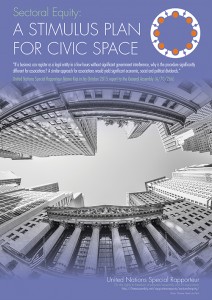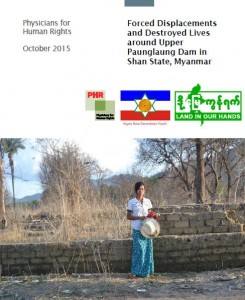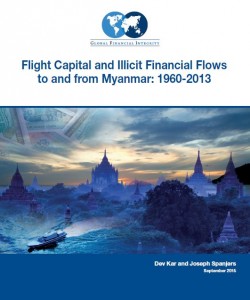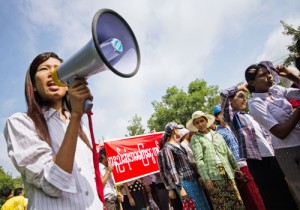Posts Tagged ‘Economy’ (48 found)
Comparing States’ treatment of businesses and associations worldwide
 In this report, Maina Kiai’s third to the United Nations General Assembly, the Special Rapporteur compares the enabling environments that States, multilateral organizations and other actors create for businesses and associations, and highlights instances where they are treated inequitably.
In this report, Maina Kiai’s third to the United Nations General Assembly, the Special Rapporteur compares the enabling environments that States, multilateral organizations and other actors create for businesses and associations, and highlights instances where they are treated inequitably.
Forced Displacements and Destroyed Lives around Upper Paunglaung Dam in Shan State, Myanmar
 In this report, Physicians for Human Rights (PHR) builds on its previous research on land confiscations in Myanmar by using an epidemiological survey tool to assess the human rights, livelihood, and health impacts on communities displaced by the reservoir created by Paunglaung dam in southern Shan state […]
In this report, Physicians for Human Rights (PHR) builds on its previous research on land confiscations in Myanmar by using an epidemiological survey tool to assess the human rights, livelihood, and health impacts on communities displaced by the reservoir created by Paunglaung dam in southern Shan state […]
Flight Capital and Illicit Financial Flows to and from Myanmar: 1960-2013
 There have been few empirical studies on flight capital and illicit trade flows to and from Myanmar. This may be due in part to significant challenges with obtaining reliable data and statistics on the country. The statistical database is weak, with gaps in data availability, and the methodology used to compile the statistics has not been reviewed for quite some time. Hence, there is a risk that compilers may not have adhered to international guidelines for the compilation of economic statistics […]
There have been few empirical studies on flight capital and illicit trade flows to and from Myanmar. This may be due in part to significant challenges with obtaining reliable data and statistics on the country. The statistical database is weak, with gaps in data availability, and the methodology used to compile the statistics has not been reviewed for quite some time. Hence, there is a risk that compilers may not have adhered to international guidelines for the compilation of economic statistics […]
Nearly US$100 Billion Flowed Illegally through Myanmar from 1960-2013, Finds New GFI Report
Nearly US$20 billion flowed illegally out of Myanmar between 1960 and 2013— draining domestic resources, driving the underground economy, exacerbating inequality, and facilitating crime and corruption—according to a new report released today by Global Financial Integrity (GFI), a Washington DC-based research and advocacy organization […]
• • •Protesting Workers Demand K4000 wage
 Over 200 workers from 15 different factories at the Hlaing Tharyar industrial zone demonstrated yesterday in favour of a K4000 minimum wage, up K400 from the government-backed amount already rejected by factory owners as too expensive […]
Over 200 workers from 15 different factories at the Hlaing Tharyar industrial zone demonstrated yesterday in favour of a K4000 minimum wage, up K400 from the government-backed amount already rejected by factory owners as too expensive […]
ေမာင္းမကန္ေက်းရြာသူ/ေက်းရြာသားမ်ား၏သေဘာထားထုတ္ျပန္ခ်က္
ထား၀ယ္ခရုိင္ ၊ေလာင္းလုံးျမိဳ႕နယ္၊ ေမာင္းမကန္ေက်းရြာသည္ လြန္ခဲ့ေသာႏွစ္ေပါင္းတစ္ရာေက်ာ္ကတည္းက
တည္ရွိ ေသာ ေက်းရြာတစ္ရြာျဖစ္ျပီး ေဒသခံအမ်ားစုမွာ ပင္လယ္ငါးဖမ္းလုပ္ငန္းျဖင့္ အဓိကသက္ေမြး၀မ္းေက်ာင္းျပဳကာ လုပ္ ကိုင္လ်က္ရွိေသာ ေက်း ရြာတစ္ရြာျဖစ္သည္ […]
US. Senate Majority Leader Mitch Mcconnell: Outcome of Fall Elections will Signal State of Political Reform in Burma
‘In light of the recent defeat of constitutional reform, I believe that steps, such as including Burma in the Generalized System of Preferences program, should be put on hold until after this fall’s election. Only after the ballots have been cast and counted in Burma can an appropriate evaluation be made about the pace of reform in the country and whether additional normalization of relations is warranted […]’
• • •Kachin State Natural Resources Development Discussion Paper
 This policy discussion paper is based on our experiences and findings of our community research over the last ten years, documenting the impacts of centralized mega development projects on peoples across Kachin state. We did this research together with local communities, including in Hukawng, Hpakant, Putao, Chibwe, Tangphre as well as others. This paper also draws on experiences and solutions from other countries where there has been conflict over natural resources. We hope this paper will contribute to the debate over political solutions to allow the future generations of Kachin state to benefit from its natural resources […]
This policy discussion paper is based on our experiences and findings of our community research over the last ten years, documenting the impacts of centralized mega development projects on peoples across Kachin state. We did this research together with local communities, including in Hukawng, Hpakant, Putao, Chibwe, Tangphre as well as others. This paper also draws on experiences and solutions from other countries where there has been conflict over natural resources. We hope this paper will contribute to the debate over political solutions to allow the future generations of Kachin state to benefit from its natural resources […]
At Your Own Risk: Reprisals against Critics of World Bank Financed Projects
 Beginning in February 2015, 40-50 residents of Durgapur village in northern India, mostly women, sat in protest for more than a month. A state-owned company called the Tehri Hydro Development Corporation India Ltd. (THDC) was developing a hydroelectric power project near their community and some villagers believed that tunneling for the project endangered their homes and the overall well-being of their community […]
Beginning in February 2015, 40-50 residents of Durgapur village in northern India, mostly women, sat in protest for more than a month. A state-owned company called the Tehri Hydro Development Corporation India Ltd. (THDC) was developing a hydroelectric power project near their community and some villagers believed that tunneling for the project endangered their homes and the overall well-being of their community […]
Analysis of the Affected Communities’ Rights and Remedies Under Myanmar Law and JICA’s Guidelines
 EarthRights International (ERI) found serious flaws relating to land rights, resettlement, and environmental protection in the planning and development of the Thilawa Special Economic Zone (SEZ) near Yangon, Myanmar. These flaws and their impacts on displaced communities and the surrounding environment are documented in two new briefers […]
EarthRights International (ERI) found serious flaws relating to land rights, resettlement, and environmental protection in the planning and development of the Thilawa Special Economic Zone (SEZ) near Yangon, Myanmar. These flaws and their impacts on displaced communities and the surrounding environment are documented in two new briefers […]









 All posts
All posts